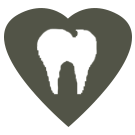Access to Dental & Oral Health Care
The CTD Messenger e-Newsletter
June 6, 2016

Above: CTD staffer Susie Angel enjoys treats at a holiday potluck. She's one of a few Texan adults with disabilities that receives regular, preventative dental care.

When we talk about securing access to healthcare for people with disabilities, what comes to mind? Preventative care and routine check ups; access to the right medications; therapies and out-patient services. Dental and oral care doesn't always make it into the conversation, but it should: dental and oral health have a major impact on our overall health.
Dental Care and Texans with Disabilities
The state of Texas provides several healthcare programs that include some level of dental and oral care coverage (CLASS, DBMD, HCS, TxHmL) to those who qualify for Medicaid. But as of February 2016, there is a waitlist of 88,681 people to get these services (source: Department of Aging and Disability Services). According to our calculations, at least an additional +150,000 adults with disabilities lack regular access to dental services in Texas.
Factors restricting access include:
· the high cost of dental services themselves, plus additional services that might be necessary for people with particular disabilities (like sedation for someone with spasticity due to cerebral palsy).
· nearby dentist offices don't take Medicaid.
· there are no nearby dentist offices. 20% of Texas counties have no dentists and 12% have only one. Almost 60% of Texas counties contain federally classified Dental Health Professional Shortage Areas (source: Texas Dental Access Coalition).
· mobility impairments prevent travel to a dentist's office.
Magic Dust vs. Real Solutions
Decision makers and experts have put forth some solutions, all of which have some merit and could help a very limited number of people. Faith communities, foundations, dental groups, and individual dentists all provide some services or resources. But these groups and individuals cannot (and should not have to) take responsibility for Texas' lack of adequate dental and oral care coverage for people with disabilities. To suggest that they could amounts to throwing "magic dust" at the problem.
A "magic dust" solution we find particularly problematic: "make SSLC dental clinics available to people with disabilities in the community." First of all, there are 13 SSLC clinics in the state with an existing caseload of +3,000 residents with complex needs, leaving few openings. Second, frequent turnover in SSLC staffing means that some do not have continuous dental professionals on staff. Third, and perhaps most importantly, none of people living in the community are in the SSLC program (which provides dental coverage) and few are on a community waiver that provides dental coverage. If a person is not enrolled in public or private insurance, it doesn't matter where services are offered; they will not get what they need. For the SSLC plan to work, the Legislature would have to give statutory direction and budgetary commitment.
Dental professionals have suggested the following solutions, which would go further to help more people.
1. Create a service delivery system within Texas dental schools. Only 1 in 3 Texas dental schools accepts Medicaid; we should expand this.
2. Create a database of dentists who will accept patients with disabilities. The Texas Dental Association, in partnership with the Providers Alliance for Community Services of Texas and CTD, has announced an effort to do so.
3. Include training on serving people with disabilities in dental school.
4. Create a Dental Hygiene Practitioner position. These Practitioners would deliver routine preventive and restorative oral health care to underserved communities under the supervision of a dentist. During the 2015 Legislature, CTD supported HB 1940, a bill that would have created a Dental Hygiene Practitioner position, but it did not pass.
Thanks to Joe Vesowate and Tara Hopkins of DentaQuest, Dr. Jeff Brunson, DDS, Dr. Adam LaLonde, DDS of the Texas Dental Association, and Beth Stewart of the Texas Oral Health Coalition (TxOHC) for contributing to this article.
Take Action: Tell us your story!
Help us set our agenda for the 2017 Legislative session! Your experience with access to dental and oral care can guide us as we set our priorities and help us put a face to this issue during session.
Tell your story »
|